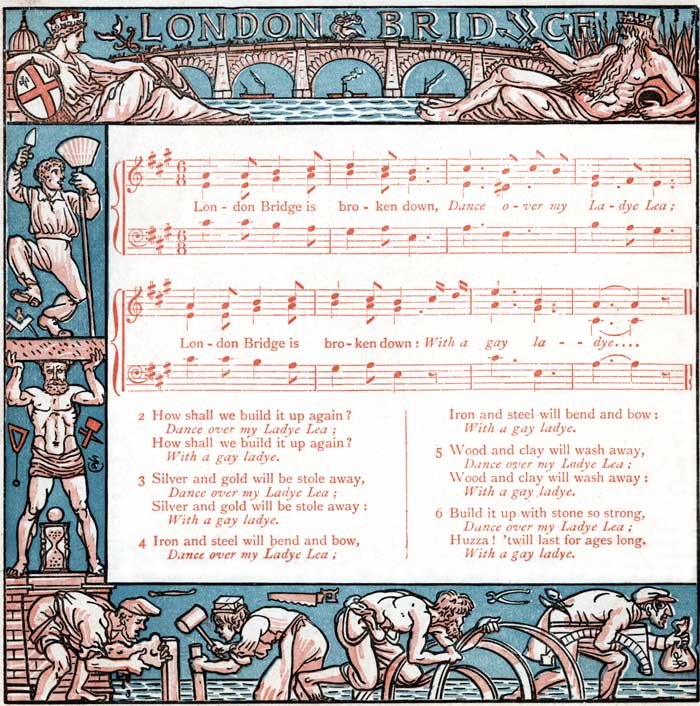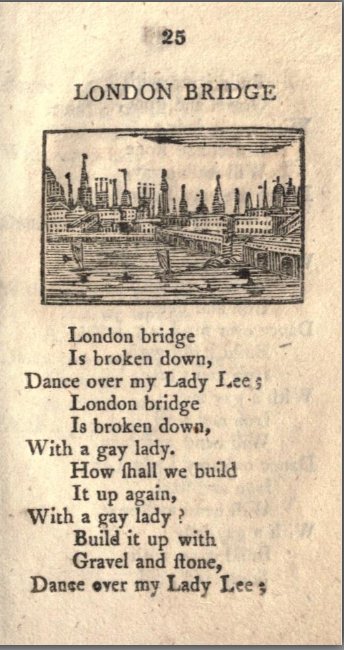London Bridge Is Falling Down

"London Bridge Is Falling Down" (also known as "My Fair Lady" or "London Bridge") is a traditional English nursery rhyme and singing game, which is found in different versions all over the world. It deals with the depredations of London Bridge and attempts, realistic or fanciful, to repair it. It may date back to bridge rhymes and games of the late Middle Ages, but the earliest records of the rhyme in English are from the seventeenth century. The lyrics were first printed in close to their modern form in the mid-eighteenth century and became popular, particularly in Britain and the United States in the nineteenth century.
The modern melody was first recorded in the late nineteenth century and the game resembles arch games of the Middle Ages, but seems to have taken its modern form in the late nineteenth century. It has a Roud Folk Song Index number of 502. Several theories have been advanced to explain the meaning of the rhyme and the identity of the "fair lady" of the refrain. The rhyme is one of the most well known in the world and has been referenced in a variety of works of literature and popular culture.
Lyrics
There is considerable variation in the lyrics of the rhyme. The most frequently used first verse is:
London Bridge is falling down,
Falling down, falling down.
London Bridge is falling down,
My fair lady.
In the version quoted by Iona and Peter Opie in 1951 the full lyrics were:
London Bridge is broken down,
Broken down, broken down.
London Bridge is broken down,
My fair lady.
Build it up with wood and clay,
Wood and clay, wood and clay,
Build it up with wood and clay,
My fair lady.
Wood and clay will wash away,
Wash away, wash away,
Wood and clay will wash away,
My fair lady.
Build it up with bricks and mortar,
Bricks and mortar, bricks and mortar,
Build it up with bricks and mortar,
My fair lady.
Bricks and mortar will not stay,
Will not stay, will not stay,
Bricks and mortar will not stay,
My fair lady.
Build it up with iron and steel,
Iron and steel, iron and steel,
Build it up with iron and steel,
My fair lady.
Iron and steel will bend and bow,
Bend and bow, bend and bow,
Iron and steel will bend and bow,
My fair lady.
Build it up with silver and gold,
Silver and gold, silver and gold,
Build it up with silver and gold,
My fair lady.
Silver and gold will be stolen away,
Stolen away, stolen away,
Silver and gold will be stolen away,
My fair lady.
Set a man to watch all night,
Watch all night, watch all night,
Set a man to watch all night,
My fair lady.
Suppose the man should fall asleep,
Fall asleep, fall asleep,
Suppose the man should fall asleep?
My fair lady.
Give him a pipe to smoke all night,
Smoke all night, smoke all night,
Give him a pipe to smoke all night,
My fair lady.
The rhyme is constructed of quatrains in trochaic tetrameter catalectic, (each line made up of four metrical feet of two syllables, with the stress falling on the first syllable in a pair; the last foot in the line missing the unstressed syllable), which is common in nursery rhymes. In its most common form it relies on a double repetition, rather than a rhyming scheme, which is a frequently employed device in children's rhymes and stories. The Roud Folk Song Index, which catalogues folk songs and their variations by number, classifies the song as 502.



RESOURCES
This article uses material from the Wikipedia articles "Nursery rhyme" and "London Bridge Is Falling Down", which is released under the Creative Commons Attribution-Share-Alike License 3.0.
© Stories Preschool. All Rights Reserved.





